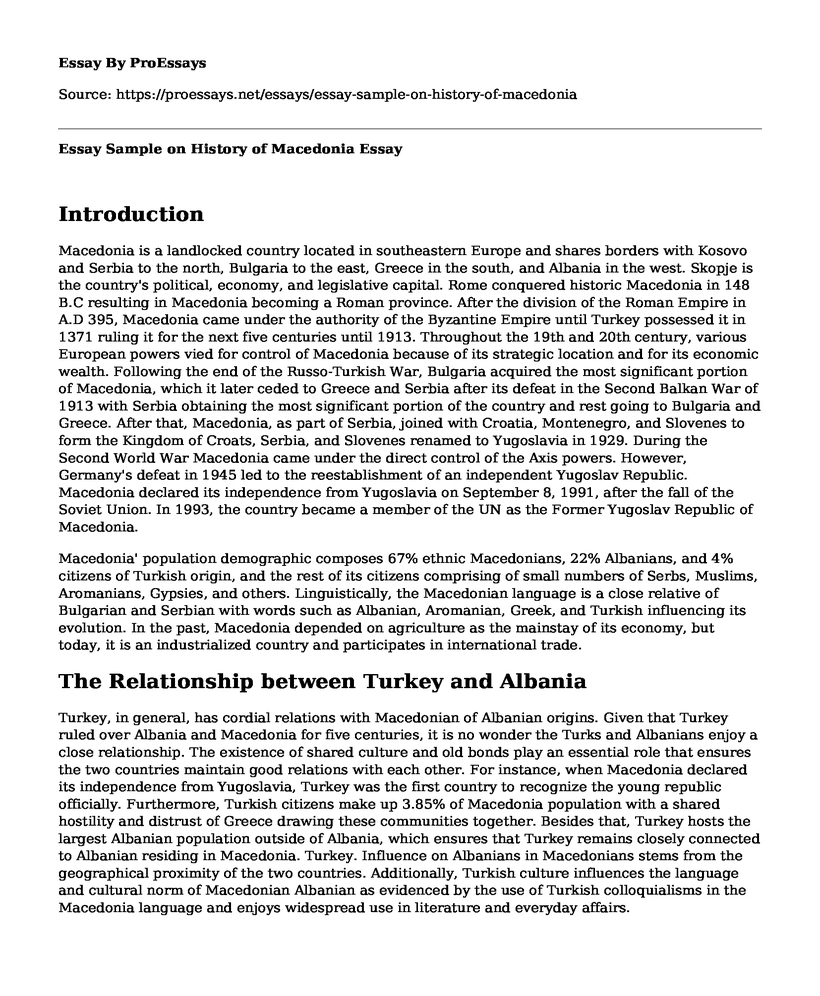Introduction
Macedonia is a landlocked country located in southeastern Europe and shares borders with Kosovo and Serbia to the north, Bulgaria to the east, Greece in the south, and Albania in the west. Skopje is the country's political, economy, and legislative capital. Rome conquered historic Macedonia in 148 B.C resulting in Macedonia becoming a Roman province. After the division of the Roman Empire in A.D 395, Macedonia came under the authority of the Byzantine Empire until Turkey possessed it in 1371 ruling it for the next five centuries until 1913. Throughout the 19th and 20th century, various European powers vied for control of Macedonia because of its strategic location and for its economic wealth. Following the end of the Russo-Turkish War, Bulgaria acquired the most significant portion of Macedonia, which it later ceded to Greece and Serbia after its defeat in the Second Balkan War of 1913 with Serbia obtaining the most significant portion of the country and rest going to Bulgaria and Greece. After that, Macedonia, as part of Serbia, joined with Croatia, Montenegro, and Slovenes to form the Kingdom of Croats, Serbia, and Slovenes renamed to Yugoslavia in 1929. During the Second World War Macedonia came under the direct control of the Axis powers. However, Germany's defeat in 1945 led to the reestablishment of an independent Yugoslav Republic. Macedonia declared its independence from Yugoslavia on September 8, 1991, after the fall of the Soviet Union. In 1993, the country became a member of the UN as the Former Yugoslav Republic of Macedonia.
Macedonia' population demographic composes 67% ethnic Macedonians, 22% Albanians, and 4% citizens of Turkish origin, and the rest of its citizens comprising of small numbers of Serbs, Muslims, Aromanians, Gypsies, and others. Linguistically, the Macedonian language is a close relative of Bulgarian and Serbian with words such as Albanian, Aromanian, Greek, and Turkish influencing its evolution. In the past, Macedonia depended on agriculture as the mainstay of its economy, but today, it is an industrialized country and participates in international trade.
The Relationship between Turkey and Albania
Turkey, in general, has cordial relations with Macedonian of Albanian origins. Given that Turkey ruled over Albania and Macedonia for five centuries, it is no wonder the Turks and Albanians enjoy a close relationship. The existence of shared culture and old bonds play an essential role that ensures the two countries maintain good relations with each other. For instance, when Macedonia declared its independence from Yugoslavia, Turkey was the first country to recognize the young republic officially. Furthermore, Turkish citizens make up 3.85% of Macedonia population with a shared hostility and distrust of Greece drawing these communities together. Besides that, Turkey hosts the largest Albanian population outside of Albania, which ensures that Turkey remains closely connected to Albanian residing in Macedonia. Turkey. Influence on Albanians in Macedonians stems from the geographical proximity of the two countries. Additionally, Turkish culture influences the language and cultural norm of Macedonian Albanian as evidenced by the use of Turkish colloquialisms in the Macedonia language and enjoys widespread use in literature and everyday affairs.
Bilateral Relationship of the US and Macedonia
The United States formally recognized the independent Republic of Macedonian on February 8, 1994, followed by the establishment of diplomatic relations on September 13, 1995. However, the United States did not recognize Macedonia using its constitutional name until November 4, 2004. The two nations enjoy a relationship characterized by true friendship augmented by partnerships in different areas. Presently, both countries have deep ties in areas such as culture, economy, political, and military cooperation - the invaluable help that Macedonia receives from the United States contributes to its stability resulting in the country gaining admission into the EU and its bid for membership into NATO. Cooperation between the two nations depends on the shared values of freedom, respect for the rule of law, a free market economy, and peace. In 2008, the US and Macedonia jointly signed Declaration of Strategic Partnership and Cooperation that enhance their bilateral relations in many different ways. In the declaration, both countries pledged to work together in fighting global terrorism while promoting international stability with firm commitments to the secure, prosperous, democratic integration of Macedonia in the greater Euro-Atlantic bloc. For example during the US engagements in Afghanistan, Iraq, and Kosovo, Macedonia lent the US considerable support in its missions there.
Over the years, both governments have taken actions geared toward improving business through the creation of institutions that attract foreign investments. In the recent pasts, Macedonia has participated in business events including Business Summit US-Balkans, the Road Show (initiatives of the Silicon Valley and the Business Forum in Chicago, visit of Macedonia business leaders to the US, and the US Business Forum. Besides that, the country participated in the SEE Economic Forum held at the John Hopkins University among others. The country's Ministry of Culture is responsible for implementing a policy that fosters close cultural between Macedonia and the United States. Each year, during Thanksgiving, the Macedonian embassy hosts a cultural event that highlights the country's culture in its embassy in Washington.
Cite this page
Essay Sample on History of Macedonia. (2022, Oct 29). Retrieved from https://proessays.net/essays/essay-sample-on-history-of-macedonia
If you are the original author of this essay and no longer wish to have it published on the ProEssays website, please click below to request its removal:
- Essay on Causes of World War II, U.S Adversaries and the Use of Atomic Bombs
- Hellen Hunt Jackson's Solutions to the Late Victorian Era Problems Faced by Native Americans
- Essay Sample on Issues Caused by Vietnam War
- Essay Sample on Nixon's Vietnam War Policy: An Unsuccessful End to a Costly Conflict
- Essay Sample on Antebellum: Abolitionists vs Slavery Supporters
- Literary Analysis Essay on The Redeployment by Phil Klay
- The Role of Individuals in Forming World History - Essay Sample







